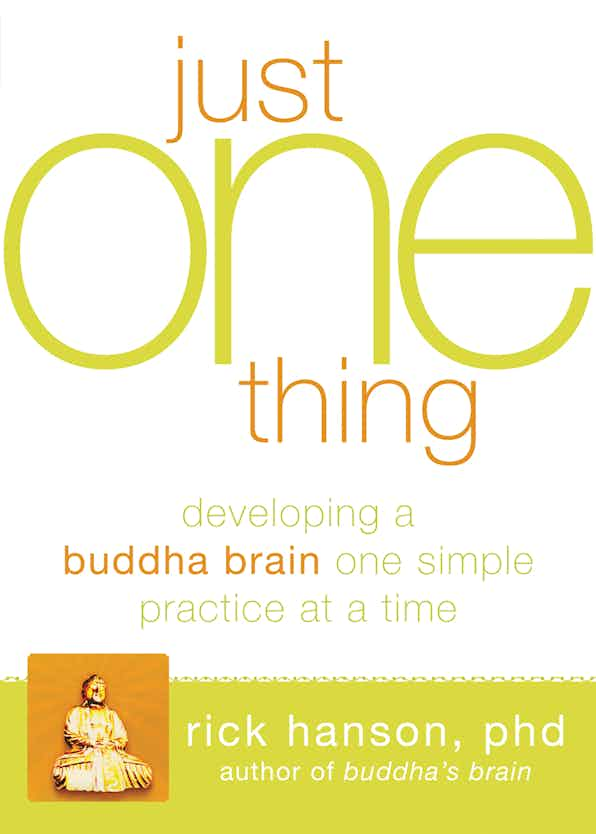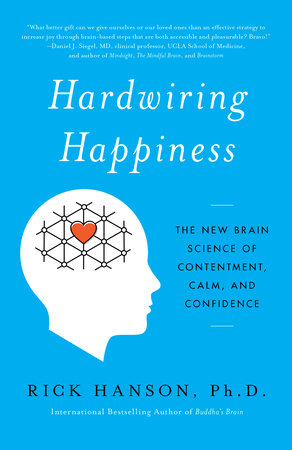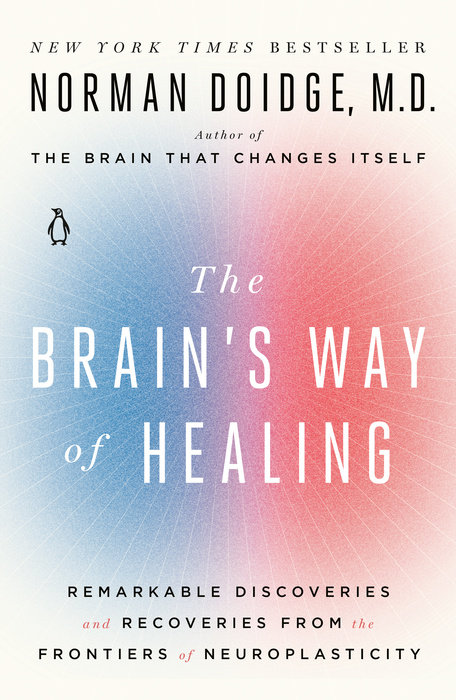
By Rick Hanson — 2011
You've heard the expression, “It’s the little things that count.” It's more than a simple platitude. Research has shown that integrating little daily practices into your life can actually change the way your brain works. See more...
FULL SUMMARY
You've heard the expression, “It’s the little things that count.” It's more than a simple platitude. Research has shown that integrating little daily practices into your life can actually change the way your brain works. This guide offers simple things you can do routinely, mainly inside your mind, that will support and increase your sense of security and worth, resilience, effectiveness, well-being, insight, and inner peace. For example, they include: taking in the good, protecting your brain, feeling safer, relaxing anxiety about imperfection, not knowing, enjoying your hands, taking refuge, and filling the hole in your heart. At first glance, you may be tempted to underestimate the power of these seemingly simple practices. But they will gradually change your brain through what’s called experience-dependent neuroplasticity. Moment to moment, whatever you're aware of―sounds, sensations, thoughts, or your most heartfelt longings―is based on underlying neural activities. This book offers simple brain training practices you can do every day to protect against stress, lift your mood, and find greater emotional resilience. Just one practice each day can help you to: • Be good to yourself • Enjoy life as it is • Build on your strengths • Be more effective at home and work • Make peace with your emotions With over fifty daily practices you can use anytime, anywhere, Just One Thing is a groundbreaking combination of mindfulness meditation and neuroscience that can help you deepen your sense of well-being and unconditional happiness.
YOU MIGHT ALSO LIKE
CLEAR ALL
BY TOPIC
BY TEACHER
BY TYPE
FILTER

TOPIC
- Healing Approaches (20)
- Buddhism (16)
- Neuroplasticity (15)
- Awareness (14)
- Brain Health (13)
- Emotional and Mental Health (12)
- Mind-Body Connection (12)
- Self-Healing (12)
- Meditation (11)
- Mindfulness Meditation (11)
- Science and Spirituality (11)
- Happiness (10)
- Well-Being (10)
- Anxiety (9)
- Self-Development (9)
- Self-Reflection Practices (9)
- Depression (8)
- Self-Discovery (8)
- Spiritual Life (8)
- Honoring Emotion (7)
- Human Potential (7)
- Inner Peace (7)
- Neuropsychology (7)
- Spiritual Healing (7)
- Stress Management (7)
- Trauma Healing (7)
- Breathwork (6)
- Chronic Health Conditions (6)
- Inner Strengths (6)
- Resilience (6)
- Romantic Relationships (6)
- Self-Limiting Beliefs (6)
- Spiritual Awakening (6)
- Spiritual Growth (6)
- Transformation (6)
- Connection with Nature (5)
- Consciousness (5)
- Dementia (5)
- Enlightenment (5)
- Entrepreneurship (5)
- Living with Illness (5)
- Love (5)
- Memory (5)
- Neurodiversity (5)
- Positive Psychology (5)
- Presence (5)
- Stress (5)
- Suffering (5)
- Trauma (5)
- Athlete Well-Being (4)
- Cognition (4)
- Compassion (4)
- Connection (4)
- Decision Making (4)
- Diet and Nutrition (4)
- Emotional Intelligence (EQ) (4)
- Empowerment (4)
- Focus (4)
- Goal Setting (4)
- Habit Formation (4)
- Illness and Injury (4)
- Inner Life (4)
- Integrative Medicine (4)
- Intimacy (4)
- Marriage (4)
- Positive Self-Talk (4)
- Self-Actualization (4)
- Self-Control (4)
- Self-Realization (4)
- Self-Reckoning (4)
- Tibetan Buddhism (4)
- Willpower (4)
- Yoga (4)
- Zen Buddhism (4)
- Addiction (3)
- Anger (3)
- Belonging (3)
- Courage (3)
- Empathy (3)
- Energy Healing (3)
- Forgiveness (3)
- Gratitude (3)
- Grief (3)
- Grit (3)
- Guided Meditation (3)
- Identity (3)
- Imagination and Creativity (3)
- Journaling (3)
- Joy (3)
- Life Challenges (3)
- Negative Self-Talk (3)
- Peak Performance (3)
- Prayer (3)
- Psychology (3)
- Religious Experience (3)
- Search for Purpose (3)
- Self-Compassion (3)
- Spiritual Direction (3)
- Accepting Love (2)
- Aging (2)
- Authenticity (2)
- Autism (2)
- Autoimmune Disease (2)
- Black Well-Being (2)
- Child’s Emotional Growth (2)
- Child’s Trauma (2)
- Compassion Meditation (2)
- Competition (2)
- Confidence (2)
- Curiosity (2)
- Digital Life (2)
- Disconnection (2)
- Dysfunctional Childhood (2)
- Ecospirituality (2)
- Fear (2)
- Finding Meaning (2)
- Generosity (2)
- Goddess (2)
- Habits of Mind (2)
- Healthy Eating (2)
- Jealousy/Envy (2)
- Leadership (2)
- Lovingkindness (2)
- Lovingkindness Meditation (2)
- Naturopathy (2)
- Offering Support to Others (2)
- Passion (2)
- Perception (2)
- Physical Health (2)
- Play (2)
- Polyvagal Theory (2)
- Positive Thinking (2)
- Problem Solving (2)
- Relationship Challenges (2)
- Sacred Feminine (2)
- Self-Discipline (2)
- Soul Mission (2)
- Spiritual Development (2)
- Storytelling (2)
- Synesthesia (2)
- The Divine (2)
- Visualization (2)
- Vulnerability (2)
- Women’s Well-Being (2)
- Abandonment (1)
- Acceptance (1)
- ADD/ADHD (1)
- Addiction Recovery (1)
- Affirmations (1)
- Alcohol Addiction (1)
- Altered States (1)
- Animal Connection (1)
- Attachment Theory (1)
- Awe (1)
- Ayurveda (1)
- Biofeedback (1)
- BIPOC Well-Being (1)
- Buddha Nature (1)
- Building Character (1)
- Changes in Libido (1)
- Child’s Challenging Behavior (1)
- Children’s Well-Being (1)
- Christian Mysticism (1)
- Christianity (1)
- Chronic Anxiety (1)
- Chronic Pain (1)
- Clinical Depression (1)
- Cognitive Behavioral Therapy (1)
- Cognitive Psychology (1)
- Communication Skills (1)
- Comparing Belief Traditions (1)
- Conscious Evolution (1)
- Creative Well-Being (1)
- Dark Night of the Soul (1)
- Death and Dying (1)
- Death or Loss of a Loved One (1)
- Dharma (1)
- Diamond Approach (1)
- Disabled Well-Being (1)
- Divorce and Breakup (1)
- Dreamwork (1)
- Epigenetics (1)
- Facing Own Death (1)
- Failure (1)
- Family Dynamics (1)
- Fellowship and Community (1)
- Female Empowerment (1)
- Forest Bathing (1)
- Freedom (1)
- Functional Medicine (1)
- Gender Identity (1)
- Genetics (1)
- Guilt (1)
- Handling a Loved One’s Illness (1)
- Higher Calling (1)
- Homeopathy (1)
- Incarceration (1)
- Indigenous Well-Being (1)
- Infidelity (1)
- Inflammation (1)
- Inner Child (1)
- Insomnia (1)
- Integrity (1)
- Interdependence (1)
- Kids and Sports (1)
- Kindness (1)
- Learning Styles (1)
- Letting Go (1)
- Life Force Energy (1)
- Lifestyle Medicine (1)
- Loneliness (1)
- Managing Energy (1)
- Manifestation (1)
- Mantra Meditation (1)
- Masculine/Feminine Dynamics (1)
- Memoir (1)
- Mental Health Challenges (1)
- Midlife Crisis (1)
- Motivation (1)
- Mythology (1)
- Nightmares (1)
- Parenting (1)
- Past Lives and Reincarnation (1)
- Personal Development (1)
- Personality Typing (1)
- Psychedelic Research (1)
- Psychedelic-Assisted Therapy (1)
- Psychological Approaches (1)
- Psychology and Spirituality (1)
- Quantum Physics (1)
- Raising Nonbinary Children (1)
- Reiki (1)
- Relationship with Money (1)
- Ritual (1)
- Rolfing (1)
- Self-Acceptance (1)
- Self-Care (1)
- Self-Love (1)
- Self-Pressure (1)
- Self-Reliance (1)
- Self-Worth (1)
- Sex (1)
- Sexuality (1)
- Shame (1)
- Sleep (1)
- Sleep Disorders (1)
- Social Media Addiction (1)
- Somatic Experiencing (1)
- Speaking Your Truth (1)
- Spiritual Quest (1)
- Spirituality and Health (1)
- Tarot (1)
- Telepathy (1)
- The Feldenkrais Method (1)
- The Yips (1)
- Time Management (1)
- Traditional Chinese Medicine (1)
- Transcendent Experience (1)
- Trauma-Informed Therapy (1)
- Wholeness (1)
- Work Ethic (1)
- Work Relationships (1)
- Work-Life Balance (1)
- Young Adult Well-Being (1)
- Zen Meditation (1)
FILTER

TEACHER
- Jon Kabat-Zinn (3)
- Luisah Teish (3)
- Bernie S. Siegel (2)
- Chögyam Trungpa (2)
- David Perlmutter (2)
- Debbie Ford (2)
- Diane Stein (2)
- Donna Jackson Nakazawa (2)
- Helen Fisher (2)
- Lisa Feldman Barrett (2)
- Louise Hay (2)
- Pierre Teilhard de Chardin (2)
- Rudolph Ballentine (2)
- Shauna Shapiro (2)
- Stephen Porges (2)
- A. H. Almaas (1)
- Amishi Jha (1)
- Amit Goswami (1)
- Amy Morin (1)
- Amy Scher (1)
- Andrew Harvey (1)
- Andrew Weil (1)
- Anna Lembke (1)
- Annie Hopper (1)
- Brené Brown (1)
- Brian Tracy (1)
- Chan Khong (1)
- Chip Conley (1)
- Cyndi Dale (1)
- Daniel Amen (1)
- Daniel Goleman (1)
- Danielle MacKinnon (1)
- Dave Asprey (1)
- David Steindl-Rast (1)
- Deepak Chopra (1)
- don Jose Ruiz (1)
- Edgar Cayce (1)
- Elizabeth Gilbert (1)
- Eric Maisel (1)
- Erin Clabough (1)
- Ervin László (1)
- Evelyn Underhill (1)
- Forrest Hanson (1)
- Frans Stiene (1)
- Gabor Maté (1)
- Howard Gardner (1)
- Jack Canfield (1)
- John C. Parkin (1)
- John Welwood (1)
- Judith Orloff (1)
- Larry Dossey (1)
- Larry Ward (1)
- Leah Guy (1)
- Linda Graham (1)
- Lisa Wimberger (1)
- Lorin Roche (1)
- Marc Ian Barasch (1)
- Marie-Nathalie Beaudoin (1)
- Martin Seligman (1)
- Matt Kahn (1)
- Matthieu Ricard (1)
- Michael A. Singer (1)
- Michael Bernard Beckwith (1)
- Michio Kaku (1)
- Moshé Feldenkrais (1)
- Norman Fischer (1)
- Oliver Sacks (1)
- Pema Chödrön (1)
- Peter A. Levine (1)
- Queen Afua (1)
- Richard Davidson (1)
- Robert Augustus Masters (1)
- Roger Walsh (1)
- Rolf Gates (1)
- Ruby Wax (1)
- Rupert Sheldrake (1)
- Sanjay Gupta (1)
- Sarah Powers (1)
- Stan Tatkin (1)
- Stephan Bodian (1)
- Stephen Levine (1)
- Tal Ben-Shahar (1)
- Tara Brach (1)
- Thomas Moore (1)
- Thubten Chodron (1)
- Tony Robbins (1)
- Zindel Segal (1)










